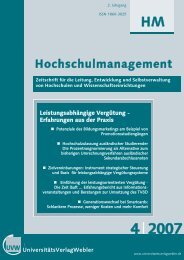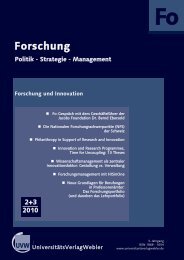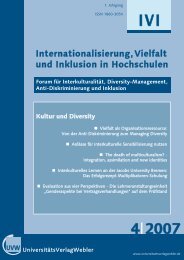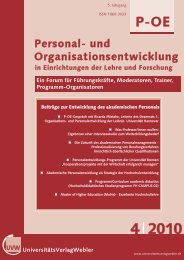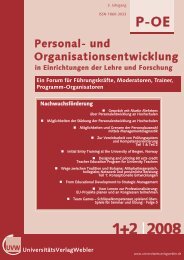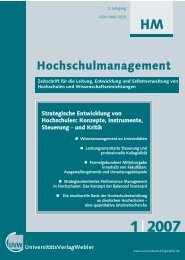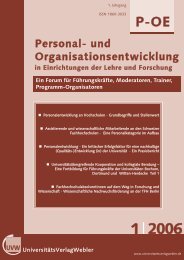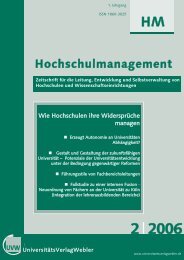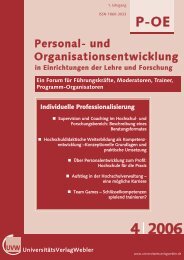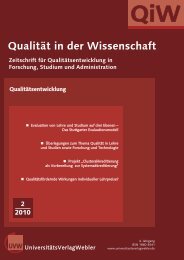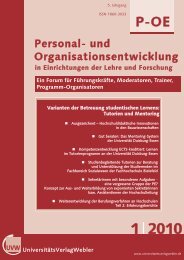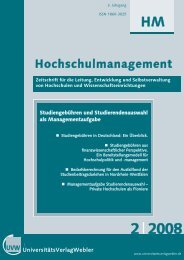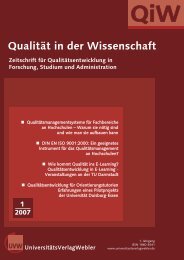Fo - UniversitätsVerlagWebler
Fo - UniversitätsVerlagWebler
Fo - UniversitätsVerlagWebler
Erfolgreiche ePaper selbst erstellen
Machen Sie aus Ihren PDF Publikationen ein blätterbares Flipbook mit unserer einzigartigen Google optimierten e-Paper Software.
<strong>Fo</strong><br />
S. Nikolova • On the use of “Lingua Franca” and local languages in the publications ...<br />
3. Humanities in all 27 member states of the European<br />
Union has more than 100 or even more than 200-year<br />
scientific tradition in the local official languages today.<br />
The termination of publications in these languages, regardless<br />
of how little they are used, will inevitably lead<br />
to disruption of these traditions and to delays in the research<br />
process.<br />
4. Very often scientists-humanitarians from around the<br />
world who carry out comparative studies or are engaged<br />
in research on humanities, concerning foreign countries,<br />
are fluent in the language of the respective countries.<br />
They not only do not have difficulty using the research<br />
written in the respective official languages, but also write<br />
their own research in these languages and publish them<br />
in these countries.<br />
5. In many cases, the research on Humanities written in an<br />
official European language, albeit little used, are published<br />
abroad in that specific language rather than in<br />
any international language, if that particular language is<br />
relevant to the nature of the respective edition or publishing<br />
house.<br />
6. It is a matter of honor and dignity for every nation in the<br />
European Union to develop a scientific tradition in the<br />
area of Humanities in its own language.<br />
7. Everything said so far does not mean that the works published<br />
in the official languages of the EU member states<br />
should not be published in international languages. Rather,<br />
it would be a good practice if they are also translated<br />
and published in the lingua franca. Of course, this practice<br />
cannot be applied in all cases due to the significant<br />
increase in the cost of the publications and the risks of<br />
publishing inaccurate or false translations. However, this<br />
practice should be extended as far as the most important<br />
works are concerned.<br />
I would also like to point out that it is not desirable to publish<br />
the works on Humanities in the numerous dialects<br />
spoken in the EU member states, although in some cases<br />
many efforts are made today to protect the so called microlanguages,<br />
in many cases attempts are also made to standardize<br />
these dialects, so that they can be used as literary<br />
languages. At this stage, they not only do not have any<br />
scientific traditions, but the endless multiplication of languages,<br />
in which the research on humanities is published,<br />
will inevitably lead them to the state of the Tower of Babel,<br />
where the mutual understanding will be very difficult,<br />
perhaps often impossible.<br />
Finally, I would like to say that the principles described here<br />
are followed consistently in all of our publications. In the<br />
publications of the CMRC every scholar is free to publish his<br />
research works in the language of his choice (so in the Palaeobulgarica<br />
journal and in the books published by us,<br />
every scholar may use English, French, German, Russian and<br />
Bulgarian and in the Kirilo-Metodievski Studii (Cyrillo-Methodian<br />
Studies) series - besides these languages also all<br />
Slavic languages). Every article and book has an abstract in<br />
English and in some cases in German. We plan to follow in<br />
the future the practice that we have been following so far.<br />
At the same time in recent years one can note an increase<br />
of our publications in foreign languages (mainly in English).<br />
In some of them we publish results that have been already<br />
presented in Bulgarian. We consider this practice to be very<br />
useful and we shall continue it in the future as we envisage<br />
to publish collections with the most important works of our<br />
scholars in English. We believe that the practice would<br />
greatly benefit. You can see how these publications look<br />
like in our editions presented here.<br />
Vortrag, gehalten auf der Konferenz:<br />
“Changing Publication Cultures in the Humanities”<br />
Hungarian Academy of Sciences, Budapest<br />
27/28 November 2009<br />
• Svetlina Nikolova, PhD, Assoc. Prof., Director<br />
Cyrillo-Methodian Research Centre, Bulgarian<br />
Academy of Sciences, Sofia, Bulgaria<br />
Liebe Leserinnen und Leser,<br />
nicht nur in dieser lesenden Eigenschaft (und natürlich für künftige Abonnements) sind Sie uns willkommen.<br />
Wir begrüßen Sie im Spektrum von <strong>Fo</strong>rschungs- bis Erfahrungsberichten auch gerne als Autorin und Autor.<br />
Der UVW trägt mit seinen Zeitschriften bei jahresdurchschnittlich etwa 130 veröffentlichten Aufsätzen<br />
erheblich dazu bei, Artikeln in einem breiten Spektrum der Hochschulforschung und Hochschulentwicklung<br />
eine Öffentlichkeit zu verschaffen.<br />
• „<strong>Fo</strong>rschung über <strong>Fo</strong>rschung” (mit Beiträgen über neue empirische bzw. theoretische Ergebnisse<br />
der Wissenschaftsforschung),<br />
• „Entwicklung/politische Gestaltung/Strategie” (im <strong>Fo</strong>rschungsfeld),<br />
• „Anregungen für die Praxis/Erfahrungsberichte”, aber ebenso<br />
• „Rezensionen”,<br />
• „Tagungsberichte” sowie<br />
• „Interviews”<br />
Die Hinweise für Autorinnen und Autoren finden Sie unter: www.universitaetsverlagwebler.de<br />
<strong>Fo</strong> 3+4/2009<br />
99



